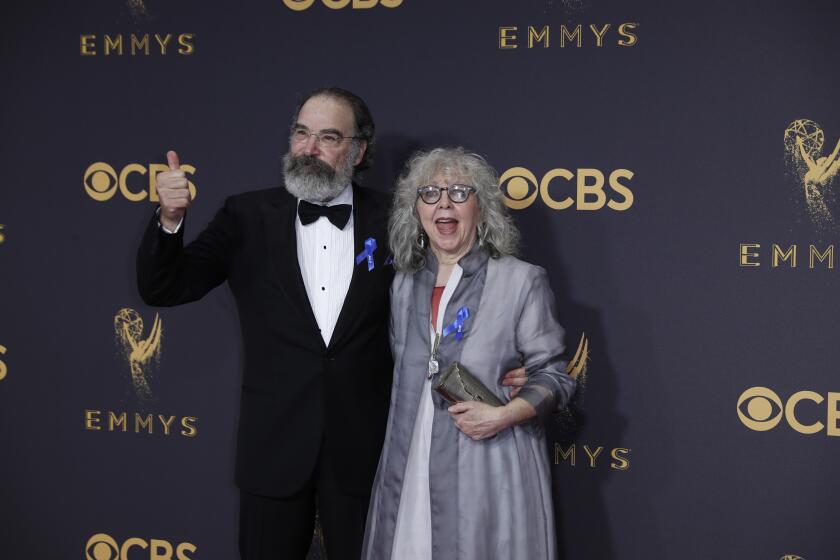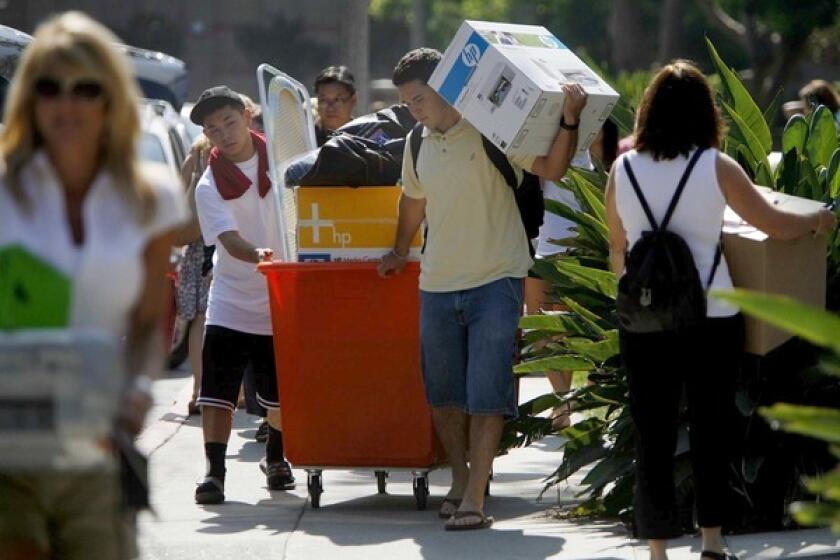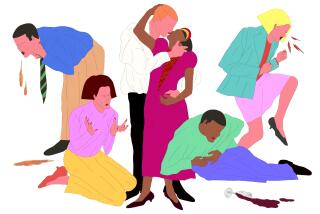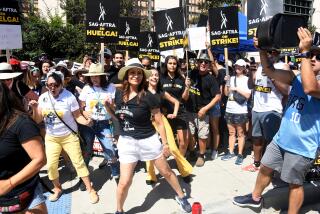Column: How Emmy nominee Uzo Aduba, Ann Dowd and more actors stay creative amid COVID-19
- Share via
So you’re an actor.
Maybe you’re famous, maybe you’re not. Maybe you work regularly enough to support yourself, maybe you don’t, at least not yet. Maybe you were in the middle of a job when COVID-19 sent everyone home, maybe you weren’t.
It doesn’t really matter. Because at this moment, this endless, unprecedented and anxiety-provoking moment, you and the vast majority of your peers — from the legends to the waiters — are all in the same boat: You’re a performer in a world that is suddenly very much not a stage, at least in the traditional sense.
Sheltering at home, writers can still write, painters can paint, musicians can play and dancers can dance. But acting is rarely a one-person deal; how do you stay in artistic shape without a cast, a director, an audience? In many ways, as it turns out, some playful, some practical, some traditional, all of them creative.
If you’re Dame Judi Dench, you vow to memorize the sonnets of Shakespeare and wind up learning TikTok dances with your grandson. If you’re Mandy Patinkin, you allow your son to post videos on social media (occasionally in service of serious fundraising) that capture your hilarious conversations with your wife. If you once starred in a hit television series, you take part in a Zoomified reunion. And there’s always Instagram — early in the shutdown, “Contagion” star Jennifer Ehle posted videos of her reading “Pride and Prejudice,” in which she also starred — or YouTube; John Krasinski launched “Some Good News” while Josh Gad revealed himself to be a very astute interviewer in “Reunited Apart with Josh Gad.”
Reggie Watts, who continues to work — albeit remotely — as bandleader and announcer for CBS’ “The Late, Late Show,” went one step further and debuted his own platform, WattsApp.
Mandy Patinkin and wife Kathryn Grody display pop culture cluelessness and enviable marital togetherness in videos that make you crave matzo.
“I wanted to have my own multimedia channel, to post videos, do live streaming, geo-locational-based media,” Watts says. “I also have a store where I sell my old electronics on it, and that’s been doing really well.”
The videos include Watts’ unintentionally prescient series “Droneversations” — interviews that are captured via the ultimate social-distancing device, the drone. Past episodes, filmed before the shutdown, featured Fred Armisen and Jack White; the first installment filmed post-COVID will feature Thunder Cat.
Watts, who shared a particularly emotional episode with host James Corden during the early George Floyd protests, is not daunted by the prospect of the entertainment industry going more fully digital. “It’s all about vision,” he says. “I don’t really notice much of a difference, on camera, in my home by myself, not getting immediate feedback. I’m usually fine with that; I just try to entertain myself and that’s usually OK.”
For some performers, the work is more internal.
Uzo Aduba, a 2020 Emmy nominee for her portrayal of congresswoman and presidential candidate Shirley Chisholm in “Mrs. America,” says she’s been using the time to get back to basics, especially observation.
“Before ‘Orange [is the New Black’] I used to observe people,” she says. “I’d see quirky little things on the train, waiting tables, being in the park — and file it in my brain. That actually has been my greatest exercise — being able to socially distance in the park, mask on, and really sit and observe people. Like parents actually parenting, not what my idea of parenting might be. And not in a crazy stalker way,” she adds, laughing, “but to really take in what is a natural response, what is a consistent response. I’ve filed away quite a few things.”
“Mrs. America” shows how Phyllis Schlafly stopped the ERA. For a lifelong feminist, it’s a tough watch. It’s also one of TV’s most important.
Especially, she says, the physical details of collective anxiety. Living in New York, Aduba experienced a city besieged by COVID-19, and while she had her own reaction to walking past refrigerator trucks being used as makeshift morgues and hearing ambulance sirens blaring all day — “and when I say all day, I mean all day” — she eventually began watching what those feelings looked like on other people.
“The anxiety is real,” she says. “You can see it everywhere. At a grocery store, at a pharmacy, the number of times people look down at the sticker to make sure they’re six feet apart, the shock you feel when you see someone not wearing a mask. Little patterns of behavior.
“The practical of part of acting isn’t happening, but the foundational and analytical aspects are. When I think of parts I have loved, and I have put my greatest inspiration into, it’s been through the analysis of human behavior.”
She recently watched a woman reading alone in the park, “head down, but watching the world, surveilling who was around her. And a family with a little kid came near, looking for a place to sit. They weren’t even that close to her, but her behavior — like she was reading but her eyes were completely tracking where they were going as they came closer. Her body started to come erect — please don’t sit here — and when they passed, there was relief, in her neck and shoulders. I thought, ‘How often does she have that experience and what is like when she goes home?’
Aduba wonders if all of us aren’t, at a certain level, delivering a performance during this crisis. “There’s awareness of an invisible danger, so we’re always at a high alert. That is what being on the stage is like — a dual life. There’s Uzo and there’s the character I’m playing. I could catch a 108 mph fastball on stage, I’m so aware of everything that’s happening. That’s what it’s like now.”
While venues including the Pasadena Playhouse and the Williamstown Theater Festival are experimenting with recorded performances, some actors are staying in shape the old-fashioned way: through workshops and classes. Director Cameron Watson has been teaching acting classes in a small Hollywood theater for years; when COVID-19 made that impossible, he asked students if they would be interested in continuing online. The result was a resounding yes.
“I started talking to industry friends, casting directors, agents, faculties of theater schools,” he says. “They were all asking the same questions — how are we going to re-invent acting classes, how are we going to do scenes, how are we going to move forward?”
He decided that his first set of classes during the shutdown (which my daughter attended) would focus on self-taping. “That’s going to be the future for some time — how we audition, possibly how we will work.” He brought in guests, including Octavia Spencer and Allison Janney, and discovered that actors want to act and talk about the craft any way they can. “Every month I think people won’t want to come back; every month they want to come back, new people want to join, because there’s nothing else we can do.”
Even though she really misses her college, and wants out of our house, my daughter decided the risks outweigh the benefits and is taking her classes from home.
Michael O’Neill will likely be teaching classes, though for him the shutdown was compounded by the cancellation of “Council of Dads,” the NBC drama he had been starring in. “It was the most talented, gracious and least selfish cast I’ve ever worked with,” he says. “So I was mourning the loss of a character I wanted to play for 25 years, and it’s worth the grieving.”
He and his daughters built a garden at their Alabama home — “so we could watch something live and grow” — and he has been working on potential projects. A two-man play about brothers that a friend has written, another play called “Alabama Boys” that he’s been working on with another friend, Thom Gossom Jr., about their different experiences growing up in a segregated state. (O’Neill is white, Gossom Jr. is Black.) “We have a script, but we are revising it in light of current events,” O’Neill says, “because there’s a new consciousness that needs to be addressed.”
Like many of us, Gregory Zarian has been using newfound time to work on long-delayed projects. Only in his case, it isn’t cleaning out closets but shoring up his memory skills. “I’m terrible at memorizing,” he says, “which for an actor is not great.” Zarian, who lives in Los Angeles, has had roles in a wide variety of series,including “Westworld.” But after a recent audition for “NCIS” required that he learn his pages before the filming, Zarian hit the books — literally — to address the issue. “I’m just taking pages out of books and learning them. A casting director once told my brother that if you want to memorize something, you read it out loud 10 times, but I’ve learned that if you whisper it, it becomes more personal and stays with you.”
As a recent Daytime Emmy nominee, for his acting work in in the digital series “Venice: The Series,” Zarian was a judge in other categories and, he says, the lack of current work allowed him the time to really study the submissions “as a master class. Really watching to see if you can tell who is telling the truth and who isn’t.
“I really want to get back to work,” he says, “but I’m kind of loving having the time to work on the details.”
Gabriel Iglesias, a.k.a. Fluffy, is not. Loving it, that is. He really wants to get back to work. His tour has been postponed until September but, all things considered, who knows?
“I’m in enforced retirement,” he says. “I’m used to being in front of thousands of people and now … I’m not.”
From his L.A. home, he has been staying engaged on social media, doing Q-and-A’s with fans — the second season of “Mr. Iglesias,” in which he plays a high school teacher, dropped on Netflix last month — and posting videos on TikTok. “I used to be anti-video, but TikTok caught my attention.”
Meanwhile, he’s bummed about missing Comic-Con, happy about his new Funko line — “they are selling way better than I thought they would” — and trying to figure out what his show will be like post-COVID, in both content and form.
“I just tell things that are happening in my life, and if it gets a laugh, I keep it,” he says. But he doesn’t plan on belaboring the shutdown in his act. “I figure that when we come back to work, everything will be about distraction, so it won’t be a big part of my show.”
His worried about the “when” part, however. “People ask are you doing stand-up online? That’s not stand-up; you are removed from the audience. You need the intimacy. Even in a big arena, the people are there, right on top of you. That engagement needs to be there for the show to feel normal to me. Two people at one table, six feet apart from the next table; it’s not the same. And if they’re wearing masks? I can’t wear a mask for a show. I’m sarcastic in a drive-thru and they don’t get it because I’m wearing a mask.“
He is enjoying the chance to get a full night’s sleep. “For the longest time, I’ve been ‘get up early, get on the plane, get on the bus, do a the show, get in a car, get on another plane ... to get eight to 10 hours of sleep every day? I can’t remember the last time that was possible.”
Many people, actors and otherwise, have used the silver lining of down time as a shield against the multi-tentacled anxieties of the pandemic. Like Uzo Aduba, Ann Dowd (“The Handmaid’s Tale,” “The Leftovers”) believes that much of an actor’s work comes down to paying attention to what is happening when you’re not working. Especially now.
She had just finished shooting the upcoming Showtime series “The President is Missing” when production was halted, so she returned to New York, where for a few weeks she “lived on the joy of having finished something.” Then she and her family decamped to New Hampshire, a place she was quite familiar with in the summer, less so in late winter and early spring. “It’s so beautiful, I loved it. Then insecurity started to surface. I started to feel irrelevant. I wondered, ‘What is this about?’ And then I thought, ‘Oh, right; work.’”
After fretting a bit, she decided to “get comfortable with the silence, with doing nothing,” she says. Working on “The Leftovers,” she recalls, she learned that people’s ability to sit with grief is very limited. “Unless we can’t get out of bed, we tend to distract ourselves. If we sit now and examine our feelings, we will have learned so much.”
Speaking to theater students online, she reminded them that this is particularly true for actors.
“I told them, ‘You will have periods of uncertainty as an actor. When you are not working, you will need to remind yourself that ‘I am an actor.’ Weathering this virus and not being in contact is a great time to strengthen that skill,” she said. “Actors have to have a perspective of hope.”
More to Read
The biggest entertainment stories
Get our big stories about Hollywood, film, television, music, arts, culture and more right in your inbox as soon as they publish.
You may occasionally receive promotional content from the Los Angeles Times.













